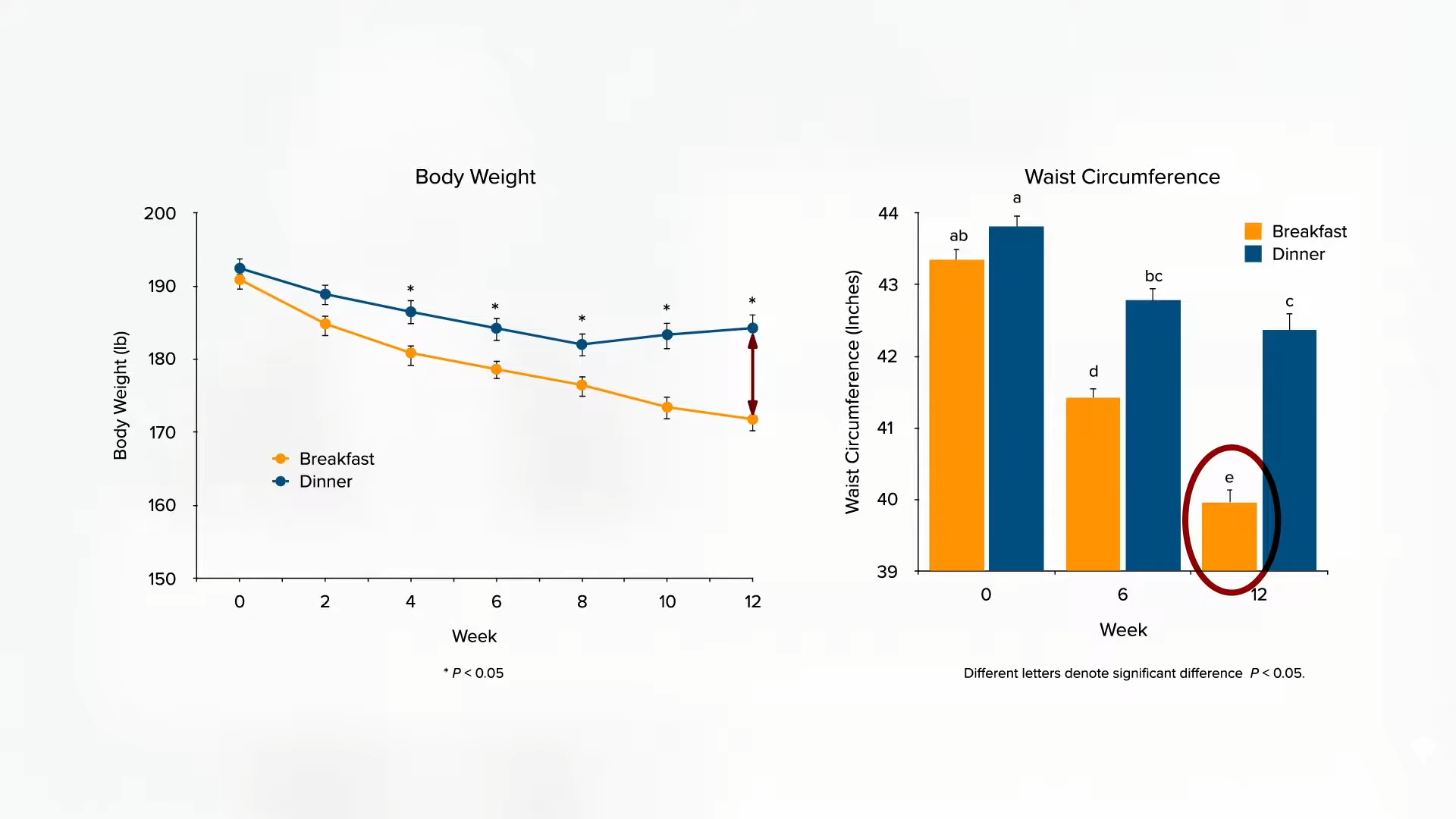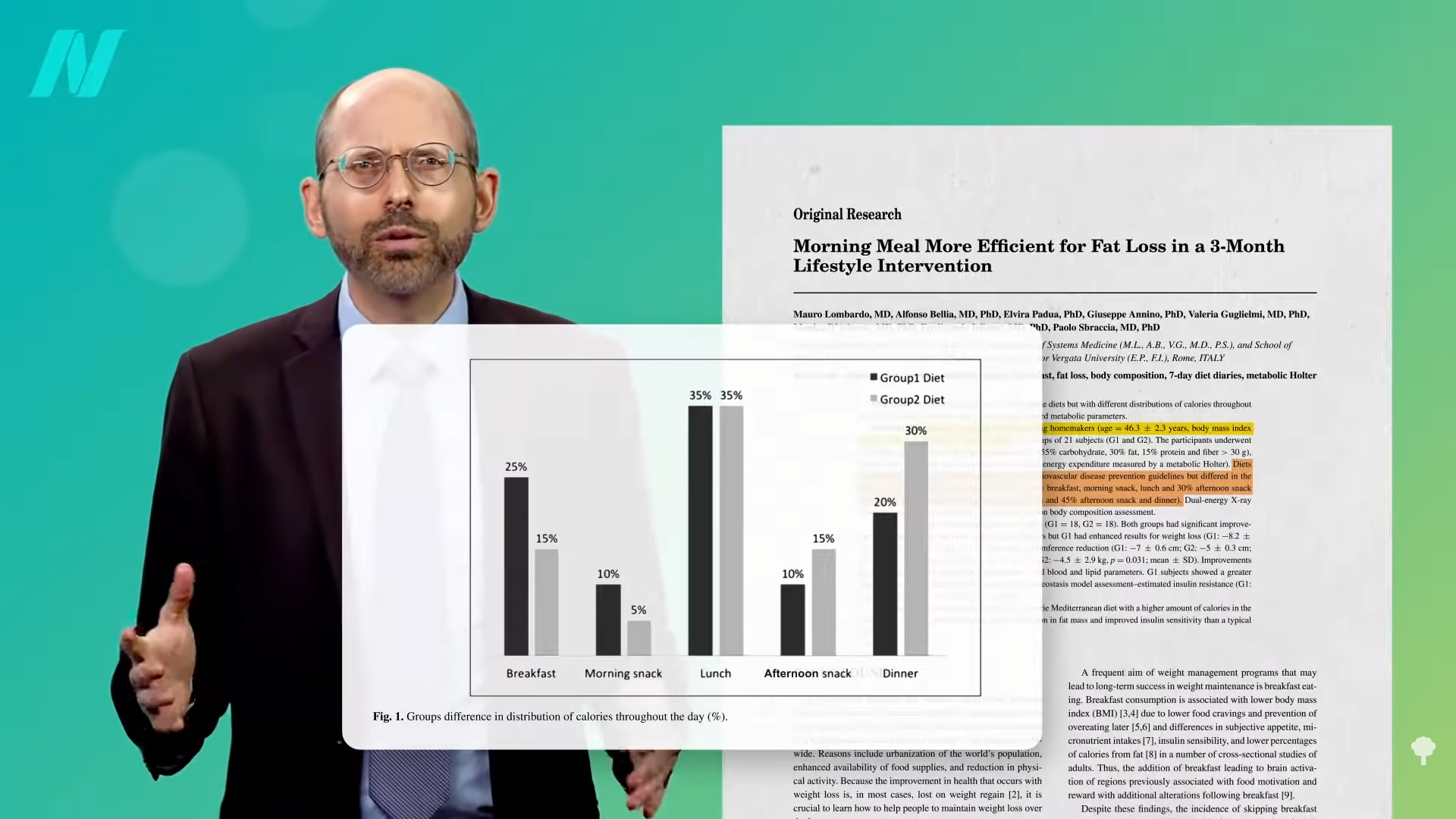Harness the ability of your circadian rhythms for weight reduction by making breakfast or lunch your important meal of the day.
In my final chronobiology video, we discovered that energy eaten at breakfast are considerably much less fattening than the identical variety of energy eaten at dinner, as you possibly can see at 0:14 in my video Breakfast Like a King, Lunch Like a Prince, Dinner Like a Pauper, however who eats only one meal a day?

What about merely shifting our each day distribution of energy to earlier within the day? Israeli researchers randomized chubby and overweight girls into one in all two isocaloric teams, which means every group was given the identical variety of whole energy. One group received a 700-calorie breakfast, a 500-calorie lunch, and a 200-calorie dinner, and the opposite group received the other—200 energy for breakfast, 500 for lunch, and 700 for dinner. Since the entire examine individuals had been consuming the identical variety of energy total, the king-prince-pauper group ought to have misplaced the identical quantity of weight because the pauper-prince-king group, proper? However, no. As you possibly can see within the graph beneath and at 1:01 in my video, the larger breakfast group misplaced greater than twice as a lot weight, along with slimming about an additional two inches off their waistline. By the top of the 12-week examine, the king-prince-pauper group misplaced 11 extra kilos than the larger dinner group, dropping 19 kilos in comparison with solely 8 kilos misplaced by the pauper-prince-king group—regardless of consuming the identical variety of energy. That’s the ability of chronobiology, the ability of our circadian rhythm.

What was the caloric distribution of the king-prince-pauper group getting 700 energy at breakfast, 500 at lunch, and 200 at dinner? They received 50 p.c of energy at breakfast, 36 p.c at lunch, and solely 14 p.c of energy at dinner, which is fairly skewed. What about 20 p.c for dinner as an alternative? A 50% – 30% – 20% unfold, in comparison with 20% – 30% – 50%?
Once more, the larger breakfast group skilled “dramatically elevated” weight reduction, a distinction of about 9 kilos in eight weeks with no important distinction in total caloric consumption or bodily exercise between the teams, as proven within the graph beneath and at 1:57 in my video.

As a substitute of 80 p.c of energy consumed at breakfast and lunch, what about 70 p.c in comparison with 55 p.c? Researchers randomized chubby “homemakers” to eat 70 p.c of their energy at breakfast, a morning snack, and lunch, leaving 30 p.c for a day snack and dinner, or a extra balanced 55 p.c from the time they awoke via lunch. In each circumstances, solely a minority of energy had been eaten for dinner, as you possibly can see beneath, and at 2:25 in my video. Was there any distinction between consuming 70 p.c of energy via lunch versus solely 55 p.c? Sure, these consuming extra energy earlier within the day had considerably extra weight reduction and slimming.

Concluded the researchers: “Tales about meals and vitamin are within the information on an nearly each day foundation, however data can generally be complicated and contradictory. Clear messages needs to be proposed to succeed in the best variety of folks. One clear communication from physicians may very well be ‘If you wish to drop some pounds, eat extra within the morning than within the night.’”
Even simply telling folks to eat their important meal at lunch reasonably than dinner might assist. Regardless of comparable caloric intakes, individuals in a weight-loss program randomized to get recommendation to make lunch their important meal beat out those that as an alternative had been informed to make dinner their important meal.
The proverb “Eat breakfast like a king, lunch like a prince, and dinner like a pauper” evidently has one other variant: “Eat breakfast your self, share lunch with a good friend, and provides dinner away to your enemy.” I wouldn’t go that far, however there does look like a metabolic profit to frontloading the majority of your energy earlier within the day.
The proof isn’t fully constant, although. A evaluation of dietary sample research questioned whether or not decreasing night consumption would facilitate weight reduction, citing a examine that confirmed the evening-weighted group did higher than the heavy-morning-meal group. Maybe that was as a result of the morning meal group was given “chocolate, cookies, cake, ice cream, chocolate mousse or donuts” for breakfast. So, chronobiology might be trumped by a junk-food methodology. General, the what remains to be extra vital than the when. Caloric timing could also be used to speed up weight reduction, nevertheless it doesn’t substitute for a nutritious diet. When he stated there was a time for each goal beneath heaven, Ecclesiastes most likely wasn’t speaking about donuts.
Once I heard about this, what I needed to know was how. Why does our physique retailer much less meals as fats within the morning? I discover the mechanism in my subsequent video, Eat Extra Energy within the Morning Than the Night.
That is the fifth video in an 11-part sequence on chronobiology. In case you missed the primary 4, take a look at the associated posts beneath.